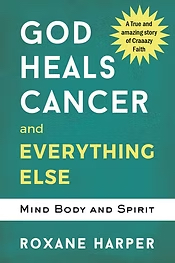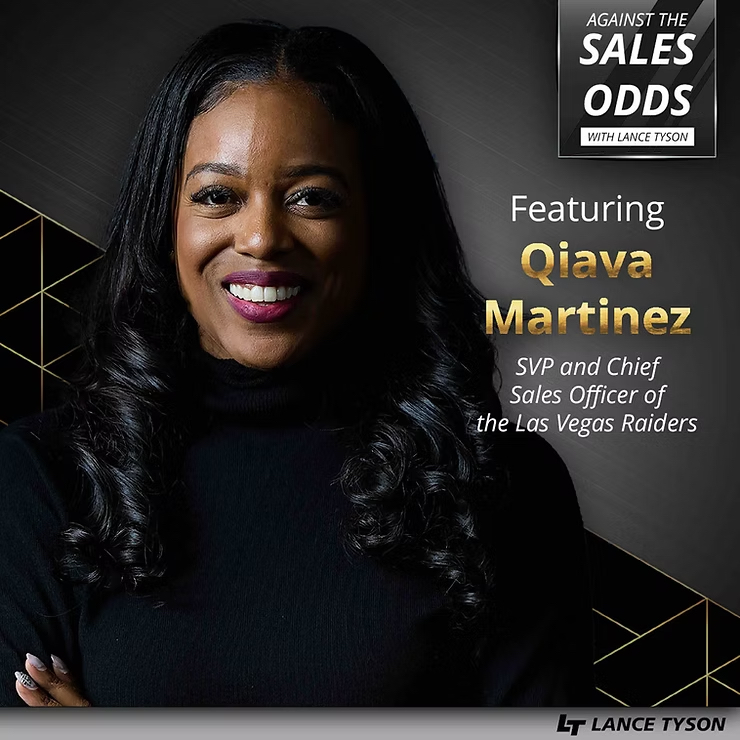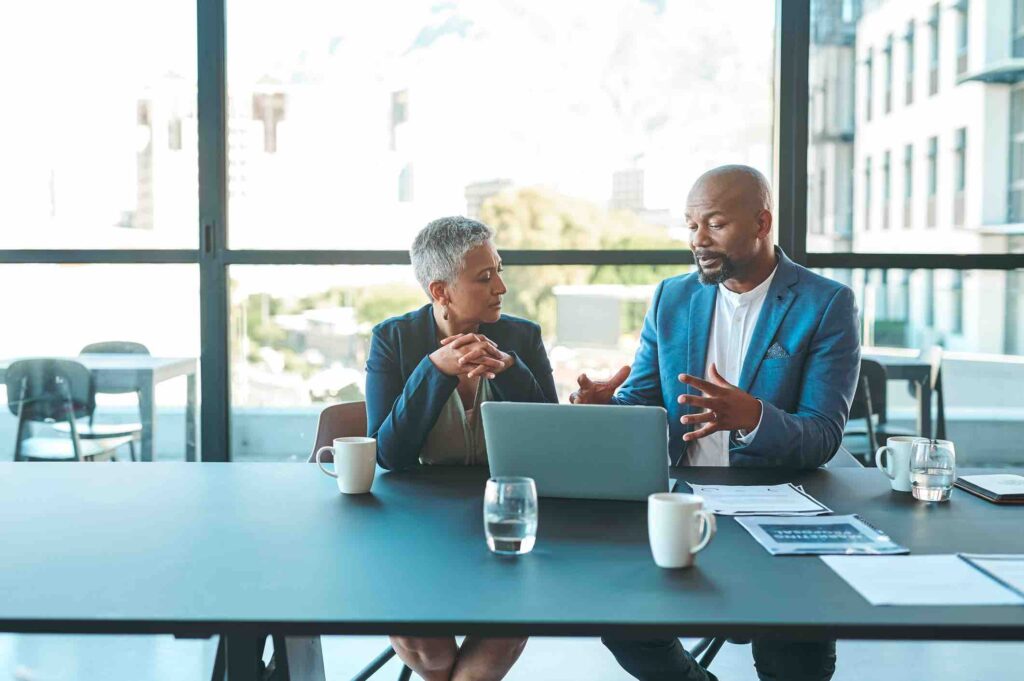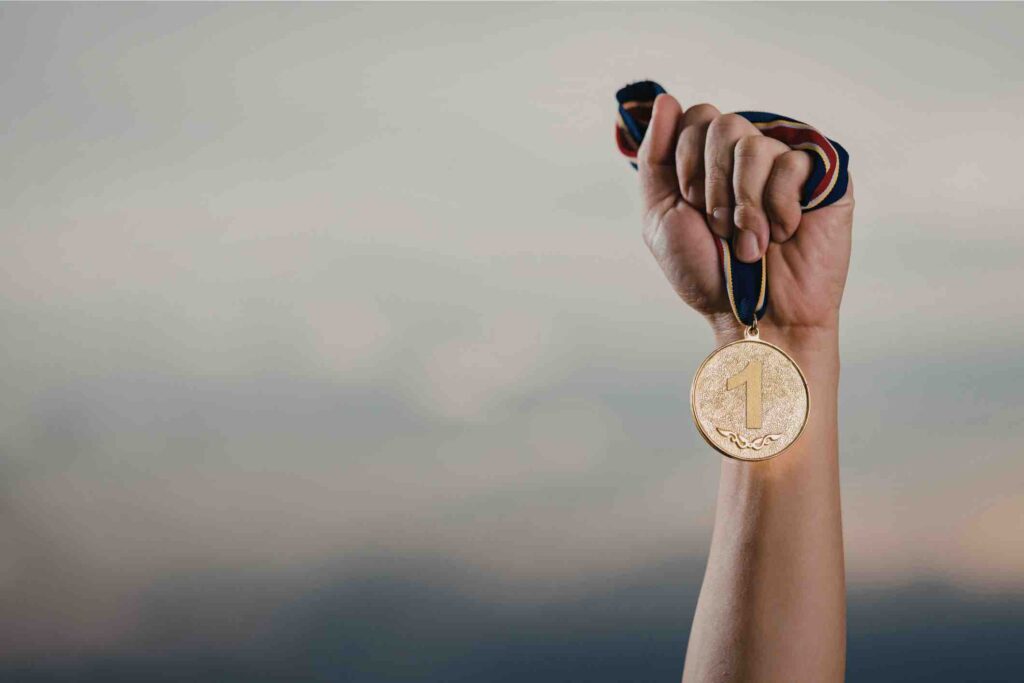In this Against the Sales Odds episode, Lance sits down with Qiava Martinez, Las Vegas Raiders SVP and Chief Sales Officer. Qiava brings us through her journey from her education to her current position in the professional sports realm. Qiava stresses how building relationships helps determine not only your team’s success but your organizational success as well. Even through major moves and life changes, she has kept the same mentality that helped her climb through the Raiders organization. From staying prepared to building relationships, Qiava gives us insight on how to stay the course to succeed. Grab your helmets and ride into her inspiring journey to success!
—
Listen to the podcast here
Staying Prepared And Ready: Stay The Course To Succeed With Qiava Martinez, SVP And Chief Sales Officer Of The Las Vegas Raiders
I am so excited about this episode. I was sitting in this person’s office. I would like to welcome Qiava Martinez. She’s the Senior Vice President, Chief Sales Officer for the Las Vegas Raiders. Welcome. I appreciate you being on.
I’m so happy to be here with you, Lance.
We were just together. I got a tour of the office and was blown away by the practice facility. You walked me around. I appreciate you being on. You’re with an NFL team. You’re standing with the shield there of one of the most iconic brands in all pro sports, the Raiders. It’s probably one of the best logos too because it’s always in black. Tell us. How did you get to Senior VP, Chief Sales Officer? Tell us about your role. How did you get to this point?
It has been a long journey. I started at the Raiders back in 2008. I was hired by Jarrod Dillon, who will always have a special place in my heart, and the inside sales manager at the time who was Robert Davis. This is my third career, believe it or not. I was an entrepreneur for the longest. When Silicon Valley had the whole shakeup, I was unemployed, depressed, and all kinds of things.
One of my brothers had me go to a career fair that the Sacramento Kings were hosting and I met Robert Davis there. I don’t know why I did it but I went to the Oakland Raiders office and interviewed for an inside sales position. That was part-time, making $10 an hour. Never turn your eyes at the small beginning because I wouldn’t change that for anything. That’s where I was put into the dungeon and was making sales.
I love Robert Davis or RD. We got RD and JD or Jarrod. We love him. Before we start at the beginning because I want to get back to that inside sales role, tell us your role as SVP, Chief Sales Officer. Give the audience an idea of what falls under your purview, that org chart, and that human talent that comes up underneath you.
I have one of the best positions within this organization. I have a wonderful team. I am responsible for our corporate partnership, sales, and activation that falls underneath me as well as ticketing, premium, and premium seating. All of the sales and service efforts within the organization fall under my jurisdiction. I have a team of about 42 individuals. They’re all hustlers and wonderful. I learn from them every single day.
Tell us about the leadership team that reports to you. You named 3 or 4 teams there. If we start with sponsorship and work left to right, you have a VP who reports under you.
I have a VP of Corporate Partnerships. That’s Christian Howard. We call him X. Everyone in the industry knows him as X. He is amazing. He had been selling before I was born. He has two senior directors who report under him. That’s Dana Geary and Scott Erdmann. They’re both fantastic. On the premium side, I have Panos Pappas. He is our Vice President of Premium Sales and Service. I have a young lady named Kylee Chandler. She is our Director of Premium Hospitality and Suite Service. I can’t forget about Adam Feldman. He’s our VP of Sales and Ticket Operations.
That’s quite a bit of organization underneath you. It’s a large team. You have senior leaders who report to you too. Let’s do the comparison. We go back to 2008. That’s when this all starts and arrives here. On top of that, for some of our audience who might not be that into sports, it’s not Oakland Raiders anymore. It’s the Las Vegas Raiders. We are at the spot. We have a brand new state-of-the-art stadium. You make this transition over this period from new branding or new way. Let’s talk about this journey. Let’s go back. Did you grow up in the Bay Area?
I am from the Bay Area 510 forever. I didn’t leave. I went to UC, Berkeley. I was a poli sci major. I thought I was going to be an attorney. Look where I am.
I didn’t know we had that in common. I went to Penn State. I was a history major and a poli sci minor. I wanted to go to law school but never got there.
Right out of college, I went and worked for Morrison Foerster for two years as a legal assistant. I was like, “This isn’t for me. There’s something else outside.”
I love the liberal arts education. They’re great thinkers. There you go. You went the law school route and thought about working in that industry. What was the change for you? What happened?
What happened was that I realized that I wanted to do more. I didn’t want to go back to school. I wanted to get my career started. I come from a family of entrepreneurs. My mom was the biggest one. I had decided that maybe the route for me was to start my business. That’s when I decided that legal wasn’t for me. There’s a lot of trying to find yourself during this period as well. I started my business and became a self-publisher of a teen magazine entitled Culture. It was nationally distributed. I had a youth board where they wrote about their life issues. I would take them to the BET Awards and NAACP Awards, and we would work the red carpets.
Here we go. Turn it over, Acorns. Let’s go. I did not see that coming at all.
I was very passionate about it. That’s why when I went to the career fair, I was depressed. My brother was trying to get me out of that. My magazine had folded because all of my backers were in the real estate industry. Even though I had subscriptions, it wasn’t enough to keep me afloat. I thought that I was going to be the next Oprah. I was going to be able to say, “You get a car,” but that’s not what the plan was for me at that moment.
That is how I ended up going to the career fair because my business didn’t succeed in the way that I wanted it to but I had received a letter from a young reader who had read one of our issues about teen suicide. The writer wrote about how one of her relatives had committed suicide and how it made her feel. The teen reader wrote me a letter saying that they had contemplated suicide. With that issue, they decided not to take their life because they didn’t realize how it would make their family members feel. If my magazine was only around for that one person, so be it.
To get something like that and know that you have that reach, then you know as well as anybody that you might as well multiply that by 5 from the 5X people you didn’t hear from that it did have an effect on. It was a piece of the information they had. I also love the entrepreneurial spirit piece because I look at entrepreneurs and salespeople and think they’re cousins. I’m going to have you self-evaluate at the end based on your understanding of publishing media at this point. What advice would you give to yourself? It sounds like you had to sell. The subscriptions come along but the big piece of it is sponsorship. I want to hear the transition but I’m going to come back to that question circling that.
That’s what helped me get the job at the Raiders because I had to sell not only subscriptions but I had to get my distribution. I had to get advertisement placement within the magazine and get the backers. I did that all on my own. Jarrod Dillon was like, “You may have done that part and you haven’t had a chance to do sports sales but come on board, and let’s see what you have.”
Your brother says, “Let’s get you there.” Older brother or younger brother?
Older brother. I have seven older brothers.
He gets you squared up. You interview with RD and JD. They said, “We’re going to take you on,” but you get a part-time role.
I got a part-time role. I set a goal for myself. I was like, “Let’s set yourself apart from everyone else.” I wasn’t at the top of the leaderboard. I was coming in a little bit later. There were some great sellers up in there. Every week, we would get a list of people we should call on. Someone else could have called on that same person a month ago. I have that entrepreneurial spirit. I love working with youth groups.
I did YellowPages.com and Oakland youth groups. I printed out all the Oakland youth groups within that area and called every single one of them, asking if they were interested in group tickets. That’s where my sales journey began. I was the top seller when it came to group tickets. I was able to get all of the nonprofits to come out. I went to RD and worked on a fundraising program. If they were a legitimate 501(c)(3), they were able to raise money for the tickets that they sold. Back then in Oakland, we had lots of tickets to sell.
If you’re not in pro sports, group sales is when you’re trying to target an organization that wants to get a team of people together to celebrate something or it’s something they do every year. You correct me if I’m wrong. It’s a very customizable sale too because you can customize talking points to the group more so than regular tickets. Here’s a question. What are the top three things that you carried over from starting the magazine into that sale?
Relationship building is at the very top. It’s being proactive. The third is being consistent. It’s relationship building, being proactive, and being consistent in everything that I would do. The goal I gave myself was three months. I said, “I’m going to only do this for three months and see what comes of it.” Within two months, they promoted me to full-time. When I got to full-time, I was like, “I’m going to hustle hard, be the one who makes the most calls, turn those calls into sales, and give myself six months in this position.”
A little under four months later, Jarrod Dillon came to me and said, “We want to build a group sales department and we want you to lead it.” I was responsible for building the group sales department for the then-Oakland Raiders. It was because I set some goals. I built a niche that I was passionate about and they saw that. I was serious about what I was doing. Don’t discredit small beginnings because all of that made me who I am now. I built the group sales department and did that for a little bit. I was then called on to oversee our premium department and help sell out suites.
Don’t discredit small beginnings because that made me who you are today.
What timeframe was that in? You’re inside six months from part-time to full-time. They didn’t focus much on group sales at that point so there was a niche sale.
At that time, we did not focus on group sales. We didn’t have any programming around it. Two other sellers and I focused on youth football and multicultural activations. We put some activations behind the group sale and rewarded the group leader. This was back in the day when people weren’t focusing on that.
You’re an event planner logistics. You’re trying to pull some things together but it can be a big hit. It’s good timing for you also.
It’s the right place at the right time.
I’m not discounting the fact that your signature is all over it. They see you. If you know Jarrod Dillon, Jarrod is all about execution and so is Robert Davis. You go into the premium space starting to lead. What’s interesting about you is you have practical sales experience based on the magazine. You start pulling it off there and then you’re into a leadership position. Tell me about the premium endeavor. How long was that?
I became the Director of Premium Seating. I believe that was back in 2013 or 2014. I was able to come on that side. We had so many suites to move in Oakland. We had about 172 if I’m not mistaken. That was a lot. We didn’t have many annuals. We had our work cut out for us. I didn’t want to do it. I was like, “I’m good. I’m comfortable over here on the group sales side of things,” but sometimes you have to get out of your comfort zone. It makes you better because once I went over to the premium side, our sales team on the season ticket side was able to sell out that stadium. I wouldn’t have had a position in group sales because there were no more group tickets to move.
Sometimes, you have to get out of your comfort zone. It makes you better.
That’s based on a need thing for everybody. Without knocking the Raiders’ heritage, I want to hear from you your best description of the stadium. You have to compare and contrast. You’re in the lack of luxury at this point but you talk about coming up through hard knocks with that stadium. I grew up with the Vet Stadium in Philly. They were the same age at that point.
It’s an old building. I don’t have anything bad to say about it because it taught me so much. I don’t think that I would be able to have an outlook on where I am without the time getting buckets for leaking ceilings and making sure that rats weren’t running throughout. That helped us form better relationships with our clients because they could have easily said, “We’re not doing this,” but because of the relationships that we established with each and every one of them, they were like, “We’re bought in.”
I’m happy that we’re here in Las Vegas and embracing not only Las Vegas, Oakland, and LA, the three places that the Raiders have lived in. It has made us and shaped us into who we are. There was a time when I was selling. I also decided, “I’m going to go out in the parking lot and upsell all of these people out here who are tailgating. If they have a half plan, I’m going to put them into a full season.” I used to call that my parking lot pimping days. I have nothing but fond memories of it.
The reason I asked is because when I have some friends over and I ask the question, it’s like, “That stadium is a spirit.” Nobody will ever know it’s a spirit. You said it perfectly. I had to connect with the human. Sales aren’t B2B or B2C. It’s human-to-human. That’s what it is.
There’s a saying out there, “Don’t take business personally.” You and I may have talked about this a little bit but I take business personally because if you’re in the relationship business, then it should be personable. Every single day, I get up and take it personally.

Staying Prepared: If you’re in the relationship business, then it should be personable.
The thing is they’re asking people to move these things and it’s taking people to do it. It is personal. It’s logical and emotional. It’s both. People justify logically but make decisions emotionally. That ties in. It runs out of inventory a little bit. We start selling more tickets, which narrows what you can sell in group sales. You’re tapped on the shoulder to say, “We need help premium-wise.” You have approximately 113 to 115 suites.
A key thing that people have to understand is these suites for the most part are a lot of B2B sales. There are some individuals who will but it’s somebody who can probably afford to do it. They’re private and wealthy individuals. You’re selling not as many annual suites, which is interesting because if we talked about the inventory at the new stadium, they’re all annuals. You’re being very transactional about them there. Tell us what the strategy was.
You brought up a great point right there because one thing we knew we didn’t want to be was transactional. We wanted to make sure of relationships. Oakland is different from Las Vegas. In Las Vegas, we do have game-by-game suite sales. We renovated and added sixteen new additional suites on our club level. There’s a wonderful sight of the field from there. We have sixteen plus a couple of other corners that we’re able to sell event by event, which is great because that’s helping us build our database of those people who may potentially turn into an annual if something happens down the road.
Is that a little bit of the nature of Vegas too? You have so many people coming into the city who are traveling there. A lot of teams do that. A lot of teams have some extra suites there.
My main responsibility when we started selling here in Las Vegas was to close out Oakland. I was still in the thick of it in Oakland. We had a wonderful team here in Las Vegas. They were responsible for selling our personal seat licenses and the annual suites in our low-seat products. That team was doing all of the sales. When I transitioned over here to Vegas, I was responsible for, “How are are going to build upon these relationships? What is the service strategy behind all of the people who we have sold here in this new town and new building? What is the communication plan?”
We had to be very intentional about how we were going to start to communicate to this new base that we knew nothing about. They may not know much about who the Raiders are. We were able to build a wonderful team on our service side. In year four of the building opening, we’re finally in a place where it feels like our season ticket members know who their season ticket reps are. Our suite owners have great relationships with our suite managers.
Going back to the strategy, we looked at, “This is a lot different than Oakland. We have a lot more businesses than individuals. How are we going to effectively communicate? The point of contact may not be the person that we need to satisfy.” You may not be able to talk to Bill Hornbuckle. Even MGM is a huge partner of ours and they also own a suite. How do we also take care of the day-to-day contact to make sure that they’re happy?
We have our communication for our day-to-day contacts and our Bill Hornbuckles. We have gifts for our day-to-day contacts and our Bill Hornbuckles because we wanted to make sure that any person who touched this account also felt like they were part of the Raiders organization. We didn’t want them to feel like, “You’re just the admin. Thank you. Can you make sure that so-and-so gets this?”
You thread that in. I’m curious. Go back because you said something interesting and that’s probably an important part of the journey. Circa 2015, you get the premium job. You start managing and building that out. You mentioned also, “I was on the team that had closed out the stadium.” You weren’t even on the ground here. You were there. Talk about those years for a second. Talk about the strategy and how you had to develop leadership there. Let’s advance that to what you mentioned with relationships.
Developed leadership in Oakland or Las Vegas?
Go back to 2015. You had to close the stadium out. What kind of leadership strategy started to formulate? What was an overall sales strategy too? Is there anything you want to talk about that? That’s an interesting timeframe.
The organization wanted to make sure that the last year played in Oakland was a great year for anyone who came in and experienced it. We also allowed all of our Oakland annuals to have first right of refusal here in Las Vegas. We also allowed anyone who purchased a suite in Oakland maybe a rental for three games. It didn’t matter. We also gave them an opportunity to get in over here in Las Vegas.
The strategy was even though we’re leaving Oakland and coming to Las Vegas, you’re still a part of this legacy and story no matter where we go. We didn’t want to make it seem as though, “We’re gone. See you later.” I’m glad that I was a part of the team that closed out Oakland because as you can imagine, here is a group of clients that continue to purchase with whatever the play on the field was.
They were your loyal base. We wanted to make sure that we took care of them but at the same time, communicating to them, “You have a part in Vegas as well that we would like for you to get in on.” We had a lot take part in that. We still communicate with our Oakland base which has not transitioned over here to Las Vegas. At our game, we had one of our longtime suite owners, Linda Cole, in Oakland. She didn’t purchase here but she was with us for a long time. She purchased a single game. When I, Panos, and Kylee went into her suite to visit her, she was overjoyed. She was like, “You didn’t have to do that.”
That’s who we are. We have a slogan, “Once a Raider, always a Raider.” We mean that for our base as well. We still communicate with them. Hopefully, they will find an opportunity to purchase. If it’s not a Raider game suite, maybe it’s a third-party event. For the Pro Bowl, we invited a lot of our Oakland annuals that did not purchase. We invited them and hosted them in a suite. We’re making sure that the base who supported us for such a long time doesn’t feel like they’re left out.
Once a Raider, always a Raider.
When you start looking at your leadership style from that standpoint, what were some obstacles you ran up against? What did you start to realize? At this point, you had a career change. You ran your business. You start to perform. You’re given the opportunity to start putting the strategy together and lead a team there. In that transition period, what did you realize about your leadership style?
There were some ups and downs but there were all great learning experiences. I had great leadership in Marc Badain who was our president and now Sandra Douglass Morgan. I’m still learning but my leadership style is more along the lines of servitude because if I can help develop someone from my tree, and they’re able to go on, get a position elsewhere, and grow, that makes me proud. I want to make sure that I give my team the best resources to succeed.
For example, I implemented leadership breakfasts where any single person on my team, it doesn’t matter if you’re a coordinator or a VP, has the opportunity to sit down with senior leadership and have breakfast. There’s no agenda. Sandra and all of the other SVPs and chiefs have sat down with my team, and we got to know them on a personal basis. We’re implementing more training for them.
I also have a group of senior managers. They’re the eyes and the ears of this department. They come to me. I meet with them once a month and they give me feedback on ways that we can get better, “What are our challenges? How do we get through this?” I had great leadership also from watching my parents growing up and that’s where I believe I get the servitude from.
They had a nonprofit organization where they helped youth and that’s probably where I get that from as well. It was Youth Achieving Destiny. My determination comes from my mom and my dad. My dad played in the NFL. He played for the San Francisco 49ers. It was part of the first Super Bowl. I learned a lot from them. I also learned that your title is your title but how you treat people is how they remember you. You have to treat people the way you want to be treated.

Staying Prepared: You have to treat people the way you want to be treated.
You talk about your employees like the service that you give a customer, which is interesting because you have internal customers and external customers. We talked about this before. You have to recruit your people twice, once to be here and once to stay. That’s so important. It’s servitude or service. It’s selfless leadership from some standpoint. It doesn’t always have to be your idea.
You have to walk the talk. I can’t say it and not do it. I’ve been in this business for quite a long time. I haven’t always made the right choices and that’s okay. The key is, “Did I learn from them?”
That is okay too.
I admit when I am wrong. That is also okay. If more leaders did that, we would have better teams. I feel as though the output that I receive from my team is they feel like they also have a seat at the table. I know what it feels like to not have a seat at the table. I like to tell people, “If you don’t have a seat, build your table and invite those to it.” I don’t want to be the one who has the only idea in the room. If we’re going to get to the best solution, it’s going to take diverse thought. That’s what you have to do. You have to make your people believe in themselves so that they have the courage to speak up.
It’s the other thing too. I always find that in great leaders, it doesn’t matter what industry. They break bread. That’s the first thing you went to, “Let’s break some bread and sit down. Let’s have dinner, lunch, or breakfast.” I’m always telling salespeople too, “Have breakfast because that’s usually the cheapest meal anyway. At least have breakfast with them. Everybody likes an Egg McMuffin at the end of the day.” You close out that stadium. What year? Talk about your role in the new building from there.
We closed out the building in 2019, moved to Las Vegas, and came over here. I was in the offices for about two months and then COVID happened.
It sounds like we were creeping up on that. You opened the office. You’re there for two months and then everything slams in everything.
I didn’t get an opportunity to get out into the community. I had a plan, “I’m going to go to this mixer, chamber event, and gala so that I can start meeting people. I want to have lunches with all of our suite owners.” All of that was shut down.
Were you still in the role of the premium side of the business when you came over?
I was on the premium side of the business. We had to become creative. There were all of the regulations. We couldn’t do anything. When social distancing came out, we had an idea. We wanted to make sure that our suite owners had the opportunity to see their suites. We hosted a couple of away-game viewing parties. Each suite owner was able to only invite 6 to 8 guests. They were in their little pod. They were able to watch the NFL game even though we had a year with no fans in the building.
We wanted them to still have the opportunity to experience it. They’re paying all this money. We wanted them to experience it. We hosted a draft party. We started to do little things around a smaller group of people where we could make touchpoints with them. Everything was lifted. People were still a little like, “I don’t know if I want to come to this event or meet with you for lunch.” I had so many lunches and breakfasts. I had to get a Peloton to help myself.
That’s a good investment. I’m with you on that one. Did you change anything about your style? You talk about compare and contrast. You were going from a certain marketplace that looked at the Raiders one way to this whole new market. Did you change anything? Was it more of the same or less? What was it?
I’m glad you asked that question because there’s a little voice inside each of us that tries to bring in that self-doubt. Coming to Las Vegas, I was like, “Maybe my tactic isn’t good enough. Maybe I should start looking at what all of these higher-end people are doing and latch on to them,” but then I was like, “At the end of the day, it’s relationships. I know I keep saying that. I am who I am and my style is what it is. That’s because there’s only one Qiava and I’m going to continue to be that person.” At the end of the day, I didn’t change anything.

Staying Prepared: I am who I am, and my style is what it is.
I didn’t suspect you. When I was in your offices not long ago, we had connected once before. I felt like I had known you for 100 years. We sat down and relaxed. If that’s any marker of how you are with your people and the customers, I was like, “Don’t do a damn thing differently.” Let’s get back to the top then because we have taken this journey. I congratulate you on this. Your name has come up in a ton of spots in the circles I run with. I admire the fact that you’ve run the course with the Raiders. There are not many people who have run the course.
Everybody goes through their seasons in their career, the falls, winters, springs, and summers. There probably have been plenty of opportunities but I admire the fact that you stayed there. You planted the seeds and look where you are inside sales. You talk about a journey. That’s a hell of a journey. When did you get tapped on the shoulder? When did they say, “Think of this role?” Was there an interim move between premiums? What was it?
We had some changes. There was the opportunity for the Raiders to look at bringing in a chief sales officer. During that time, I was over premium, sales, and service. I was tapped on the shoulder to interview for the chief sales officer position. I never thought that there would be an opportunity to do that.
Did they ever have a chief sales officer before that role came into play? Was there one before that?
They changed it. It was a chief revenue officer over to the chief sales officer. Underneath the chief revenue officer position was Raider Image retail but retail falls underneath our CFO. This one is strictly all of the sales efforts for the organization.
You were setting on a role that wasn’t there. There were parts of the role. Without going into it, there are a lot of changes you have to navigate politically as a leader and things like that. That’s always tough, especially when you’ve worked for those people. You have a healthy respect for legacy, which I admire. You got tapped on the shoulder to interview and got it.
I would tell everyone to make sure that you stay prepared. You stay ready so you don’t have to get ready. I took this to heart when I was tapped and I said, “I’m going to go for it and give it my all.” I put together a PowerPoint, a plan, and a strategy and then took it a step further. I said, “I’m okay with PowerPoint. Let me hire someone to make this PowerPoint look a certain way.”
Make sure that you stay prepared. Stay ready so you don’t have to get ready.
There’s something to be said about the presentation. If I’ve learned anything, the cover of a book matters.
I interviewed a couple of times, and then it was decided that we were going to make the position interim to allow the next president to make that decision. I did that for a couple of months and then Sandra was named president. I interviewed her and then she made her decision. It was the right choice.
This role becomes wide. I’m curious. I’m going to assume you have to take your personal philosophy. That philosophy has to become part of your strategy and then you have to embed that into your leaders. What was the biggest adjustment you made to all that?
I can do ticketing and premium on my sleep. I can do backflips and all of that. It was the corporate partnership piece that I was like, “This is new territory for me,” but I’m comfortable with saying, “I don’t know this side of the business. I want to sit here and learn from each one of you, which I do. I want to hear what the challenges are and where our opportunities are.” I did that.
Christian Howard is fantastic. He can sell a t-shirt off of a person. He’s that great. I was able to come on board and put some processes in place. We also have two wonderful sales directors. They were promoted. Karen Fontana and Holly have been in this industry for a while. I was able to evaluate and look at all of their strengths and say, “This is an opportunity for people to be promoted.” We have Dana who has been running our activations team and I was able to learn a lot from her. I have a better hold on this partnership piece of the business.
I’m going to go back to what you said. Stay ready to be ready. If I’m going to analyze your career, you were made for sponsorship, and here’s why. You go back to the magazine. To be able to draft the strategy for that and see how it was going to enter the market, that’s everything you do with partnerships. On top of that, you then go to groups, which you gravitate to. That’s more of a partnership sale than a ticket sale because when you sell premium, it’s a box. When you sell a group, it’s a concept. It’s different. You’re already made for it. I am going to say one thing. You’re a people-first leader. I don’t think anybody has ever accused you of micromanaging unless you were uncomfortable with the results.
There have been times when I was uncomfortable with the results.
Everything you’re saying though says, “I want to listen to what you have to say.” I didn’t hear, “I’m going to have my opinion,” because you’re not afraid to give your opinion. I know that but when you talk about customers and your people, you’re not the classic micromanager. I can tell when somebody is a micromanager because I deal with so many. That’s so interesting. I love this. If you want to be ready, you better stay ready. Now that you’ve added this bigger executive piece to mid-level management, what’s the core philosophy that you communicate to your leaders on a day-to-day basis? You want them doing what? What is that?
I want them to walk with a certain air of humility because there are people who are watching you who you may not know are watching you. It’s the person who wants to be the next Qiava or the person who’s going to be the next whatever. Walk with integrity and humility. There’s nothing beneath you. If you see a piece of trash in the stadium, pick it up. Don’t walk over it. Make sure that you’re communicating with your team and leading by example.
Your repetition is your reputation. I’m going to ask you a tough question because I was watching your body language and we’re going to bring this down for a landing. You can’t answer both because I’m going to dive in here with you. When you start to talk about your family, your brother, your mom, and your dad, you have to pick one. Mom and Dad or whoever is reading, this means nothing else but on the back end, who’s your person? Who has helped you the most? You have to pick one. I know it’s going to be hard for you. Go.
I have 7 brothers and 1 sister.
You have a big range. You have to go. Who’s your person? Who’s your plugin?
They all mean so much to me in so many different ways. They all help me and their stories are my stories.
Where are you in the mix?
I am the oldest girl but I’m number four. I’m going to have to say it’s my mom.
How come?
She is the Kris Jenner of this family. I went to lunch and called her up. She was like, “What’s next? What are you working on next?” She’s always pushing us to be better and have more than one income stream. She’s like, “This is great but what’s next?” She’s pushing us. At the age of 72, my mother, Roxane Harper, got a US patent.
For what? What are you getting a patent at 72 for?
She invented what she calls baby bumpers that you put over the furniture and then you could take it off.
It sounds like she has had people in her life who have run into stuff.
She had nine of us.
Maybe we’re going to have to get Roxane on the show.
We have to get Roxane on. If you make me choose, I’m going to have to go with her but my mom and dad are one. If you see my mom, you see my dad. He’s right there with her.
When I talk to leaders because there’s a decisiveness that has to go, I’m like, “Pick one. That’s the toughest one you have to pick when you got all those family members.” My wife has taught me the concept of who is your person.
It’s my mother.
That’s probably the person you call when you want to celebrate summer and there’s nothing wrong with that. That’s your person.
She’s my person when I want to celebrate, cry, and all of the above. She’s always pushing. My husband too. I have to give him a shout-out, Jonathan Martinez. I wouldn’t be where I am without his encouragement. He also motivates me. There was a time when I was like, “I’m going to change my leadership style. I’m not going to be as personable and let people know who I am.” He was like, “You can’t do that.”
That wouldn’t work for you in a million years. I wouldn’t even believe it. It wouldn’t even work. Here are the last couple of questions. The first one is you have to pick a song. You’re going in. Your team is going to do a monster deal. What’s that song playing in your head?
I’m a Boss.
You didn’t have to think about it. Next question, I’m going to assume with that many siblings, you probably have some nieces and nephews.
Lots of them.
Take your nieces and nephews. It doesn’t matter who it is. There are two of them who come up to you, one niece and one nephew. They say, “Auntie Qiava,” or how they refer to you. Most of mine call me LT. They’re between 7 and 9. Think of that age group. They say, “What does it mean to be successful?” You have to give it to them like that.
It means that you were able to do the best of your ability for the one thing that you love the most.
You can do the best of your ability for the one thing that you love the most.
Here’s the last one down for landing. I don’t know if you gift books but if you had to gift a book, of all the things that you read and experienced, what book would you gift?

God Heals Cancer and Everything Else
There are tons of industry books out there but the one that means the most to me is the book that my mother wrote. She wrote a book, God Heals Cancer and Everything Else. It’s her journey of being diagnosed with cancer and also not having it anymore. I appreciate that story the most because when she was diagnosed, that was years ago, and my mom is still here. My person is still here.
I knew we would have so much fun. I know so much more about you now. I’m so excited. Thank you for being on. Thank you for two things. Stay ready to be ready and talk about extreme candor. You can see it all over your face. Thank you so much. I appreciate you.
I appreciate you.
Important Links
Las Vegas Raiders YellowPages.com God Heals Cancer and Everything Else
About Qiava Martinez
Qiava Martinez is in her 15th year with the Raiders. As the SVP and Chief Sales Officer, Martinez is responsible for leading and managing all sales and customer retention efforts for the Raiders and Allegiant Stadium events through monetizing corporate partnerships, suites, and premium and season ticket sales. Prior to being named SVP and Chief Sales Officer, Martinez was Vice President of Premium Service and Guest Experience for the Las Vegas Raiders. During the Las Vegas relocation period, Martinez was part of the PSL, Suite, and Loge Seat sales sales strategy.
Martinez began her career with the Raiders in 2008 as an Inside Sales Ticket Representative, then was elevated to Director of Group Sales and Fundraising for three years. Shortly after, Martinez was promoted to the Vice President of Premium Seating and Service. In 2022, Martinez was awarded the Inspirational Woman in Sports from WISE Las Vegas. In 2016, Martinez was honored as one of the Powerful Women of the Bay Area. The award celebrates women passionate about educating, empowering, and connecting with women in business and the community.
Prior to pursuing a career in the sports industry, Martinez was the publisher and owner of Culture Magazine, an outlet used by teenage writers to express their life experiences. Martinez also served as Executive Director for Youth Achieving Destiny, a youth organization that served underprivileged youth by teaching entrepreneurship training and development. Born into a football family, Martinez’s father, Willie Harper, played in the NFL for 13 years (11 with the San Francisco 49ers).
Her brother, Matthew Harper, is the defensive backs coach for the 49ers. Her youngest brother, Josh Harper, was signed as an undrafted free agent by the Oakland Raiders in 2015. Martinez earned her Bachelor of Arts in political science from the University of California, Berkeley. She also received a Master’s in Business Administration from the University of Phoenix, Bay Area Chapter. She also sits on the following youth and sports-focused boards: Teach For America Las Vegas Chapter and the Icy Baby Foundation. She and her husband, Jonathan, reside in Henderson, NV, with their daughter, Harper.




